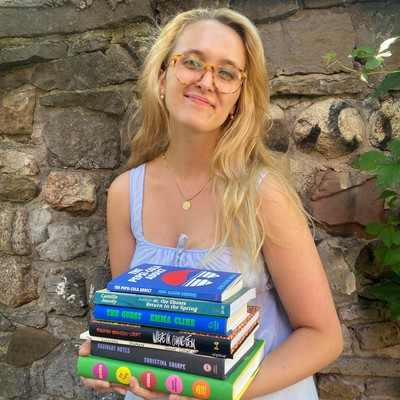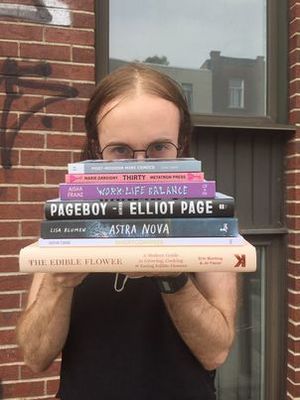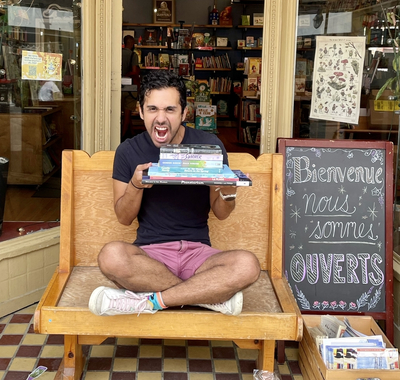Staff Picks 2020 - Saelan
October 14, 2020
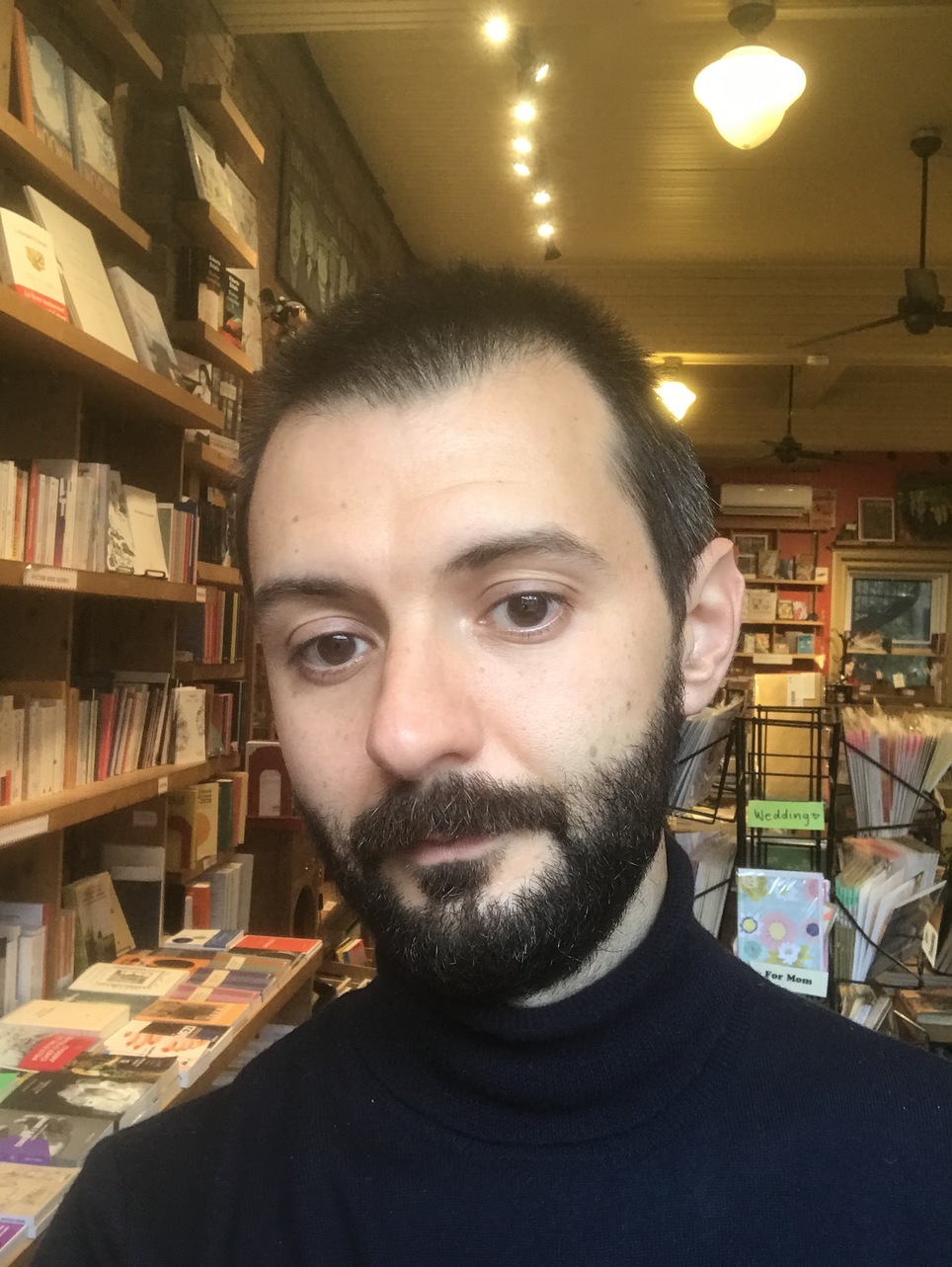
Difficult Reading
Like my colleague Arizona, who started off our Staff Picks round-up this year, I worked all the way through the first lockdown here in Montreal and, suffice to say, it has been a wild year for bookselling! I was amazed by and grateful for the outpouring of support among the community for our store, and getting to see the remarkable patterns of reading habits during this year of crisis and revolt has been a source of great pleasure and fascination. Personally, I have to admit that I have found it more difficult than ever to concentrate on reading amid the anxiety, the pressures of work and parenting in a pandemic, and the lure of doomscrolling, but here are a few of the books I did manage to enjoy so far this year (and a few I hope to get to soon).
Fictions
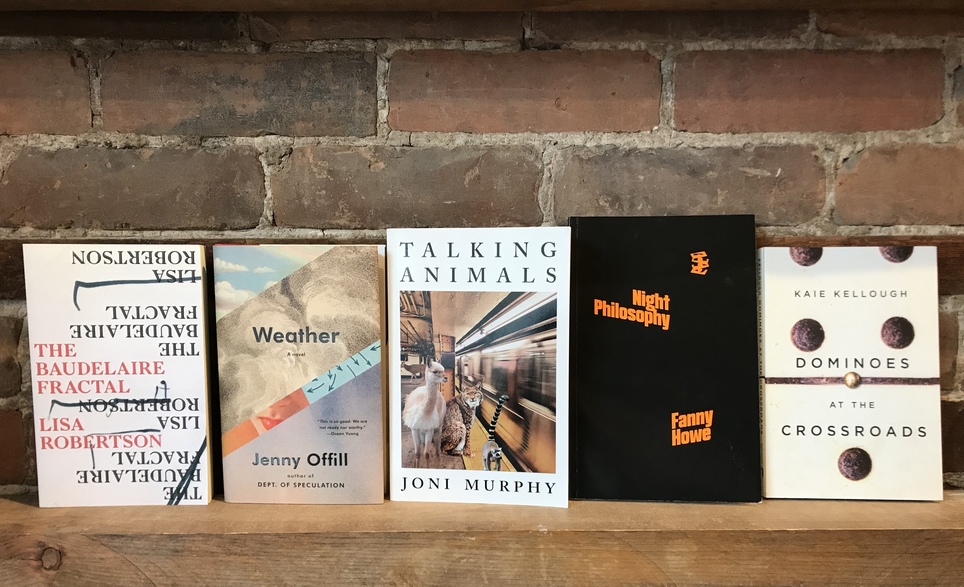
What kind of fiction do I like? Books of non-poetry by poets, books about failed grad students and other overeducated members of the precariat, books written from life, books about artists, writers, musicians, and hopeless revolutionaries, books that side with the powerless, books that grasp the enormity of the ongoing crisis of colonial, capitalist modernity, books that make you laugh anyway.
I've been meaning to read poets Fanny Howe and Lisa Robertson for years, and both published new books this year that I loved. Robertson's novel loosely imagines her as a spiritual inheritor of Baudelaire, but despite not fully realizing the premise, she spends the text spinning off incredible sentences and paragraphs about being a girl and becoming a writer in 1980s Paris. Fanny Howe's Night Philosophy, from the wildly promising Divided Publishing imprint, collects luminous fragments from her fifty-year career—bits of poetry, essays, and appropriated texts—that revolve around the figure of child and the idea of vulnerability as a spiritual condition. A real "axe for the frozen sea" book that made me want to read all her writing.
Joni Murphy and Jenny Offill's latest novels both feature grad-school dropouts as main characters: Offill's is a librarian who takes a job answering emails for her former supervisor, the host of a podcast about the end of the world; Murphy's is a lovable alpaca bureaucrat who gets tangled up with Sea Equality revolutionaries in a New York entirely populated by animals. Both are slyly funny, endlessly rewarding books about living a daily life in a world you know is deeply wrong.
Kaie Kellough's Dominoes at the Crossroads is a collection of interlinked short stories about Caribbean diasporic characters (students, jazz musicians, suburbanites, and secret agents) centered around the territory now known as Montreal. A sound artist and poet, the book resonates with the sound of lives lived between incongruous and overlapping places and histories. Kellough is scrupulously faithful to the textures of specific sites while also taking bold speculative leaps into the past and future, narrating dreams, confessions, and alternate realities with daring wit and more than a few flourishes of self-reflexive acrobatics. An instant classic of Montreal lit that was, in my opinion, criminally overlooked for the Giller Prize shortlist.
Non-fictions
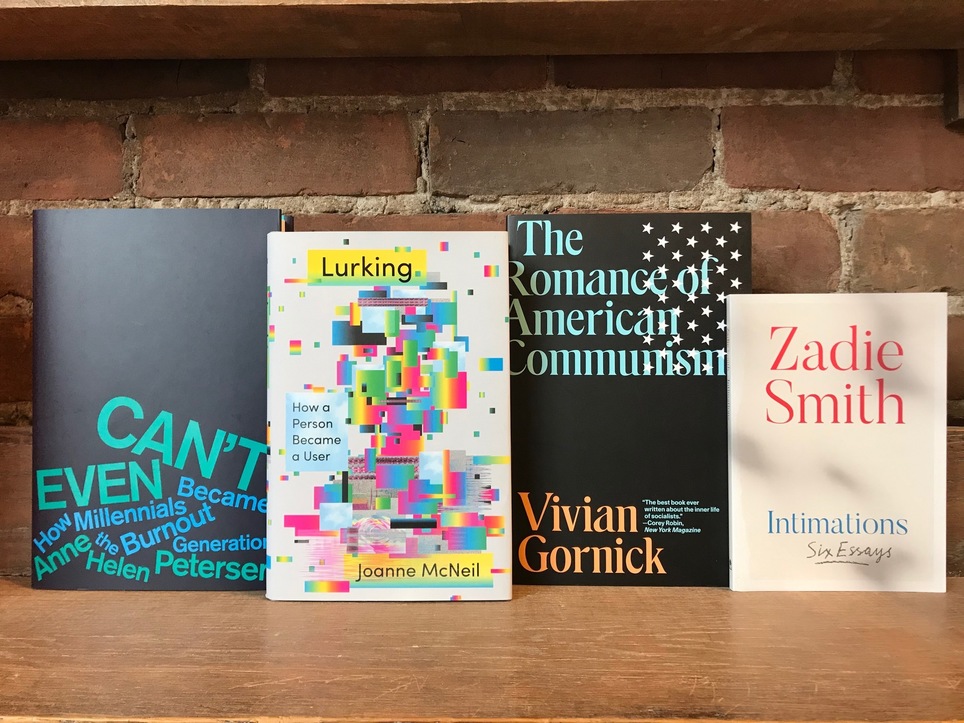
All of these non-fiction picks analyze some facet of the present as a crisis: Anne Helen Peterson's book-length adaptation of her deservedly popular viral essay on millennial burnout surveys how people in my age bracket became debt-burdened, overworked, and depressed.
In Lurking: How a Person Became a User, critic, writer, and sometimes curator Joanne McNeil offers an essayistic history of the social internet—not told as a tale of renegade programmers or entrepreneurial sharks, as it so often has been, but from the more intimate, personal perspective of the user, tracing the disappearing potential for an alternative internet that could be less commercial and less corporate. (You can read my interview with her here).
Vivian Gornick's The Romance of American Communism was originally published in 1977 and now republished this year by Verso, to some fanfare. In the new introduction, Gornick talks about how she grew up among Jewish immigrant Communists for whom the party was the world. Once the American Communist party dissolved (in the wake of revelations about Stalinism) and she left home, she discovered that most Americans had no concept whatsoever of the social world of Communists that existed in their country. She laments that she wrote the book badly; I'd say that is very sentimental at points, and that she narrativizes the experience of her subjects in ways that would perhaps feel inappropriate in current non-fiction, but the oral histories she relates are endlessly fascinating at a time when Leftist politics are resurgent, both for their similarities and profound differences from current struggles.
And there's much to say about Zadie Smith's latest book, a slim collection of essays written during quarantine lockdown on time, work, community, and suffering. It is our True Reads book club pick for November 11, and I'm hosting, so please join me and share your thoughts!
Graphic Novels
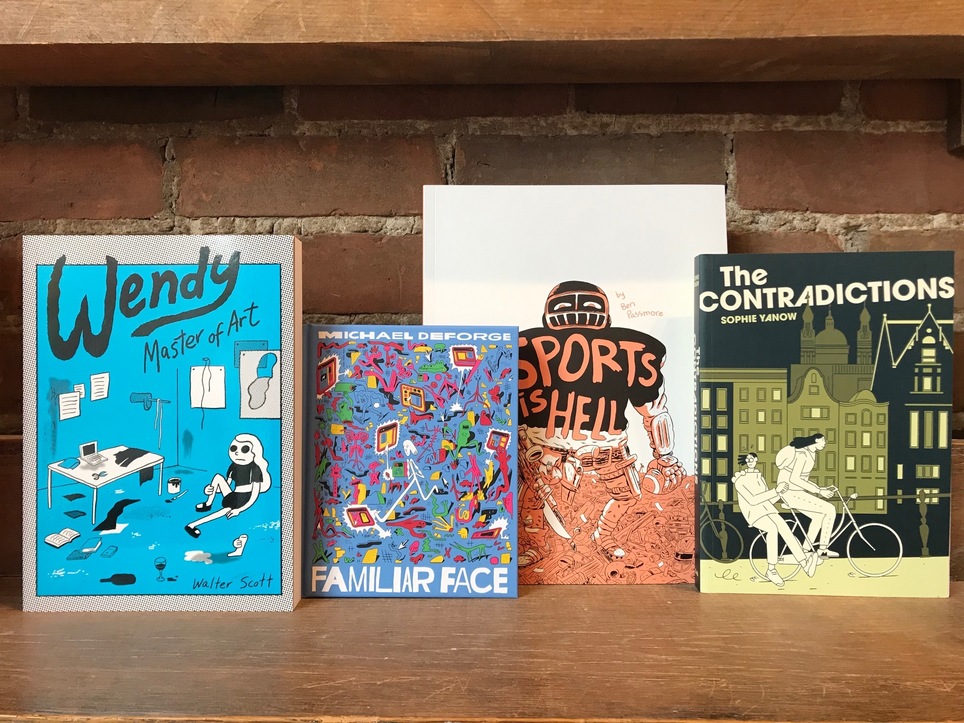
Walter Scott's Wendy series is a treasure of contemporary comics—in my opinion, the most accurate portrayal of the contemporary art world to ever exist in graphic form—so I am delighted that Drawn & Quarterly published his latest book, Wendy: Master of Art. In it, Wendy finally attends art school in Hell (ie. Guelph, Ontario), discovering love and a newfound maturity along the way, though the book still features plenty of wild antics (and hangovers). Wendy's MFA certification has also paralleled Scott's own development as an artist: he graduated in 2018 and has had numerous high-profile exhibitions of his drawings, sculptures, and videos since, including a solo exhibition here in Montreal that was just closed due to the city's ''red zone'' designation. Watch out for my article on his art practice outside of comics, forthcoming at Momus.
I also loved Michael Deforge's latest, Familiar Face (it's hard to keep up with an artist as prolific as Deforge, but this is a particularly good one), as well as Ben Passmore's Sports is Hell, which channels the energy of BLM protests by imagining a football riot as a full-on race war. I was also charmed by Sophie Yanow's The Contradictions, a minimalist coming-of-age story about an unassuming young lesbian hitchhiking Europe with her emotionally unavailable anarchist friend/crush.
Smaller Press
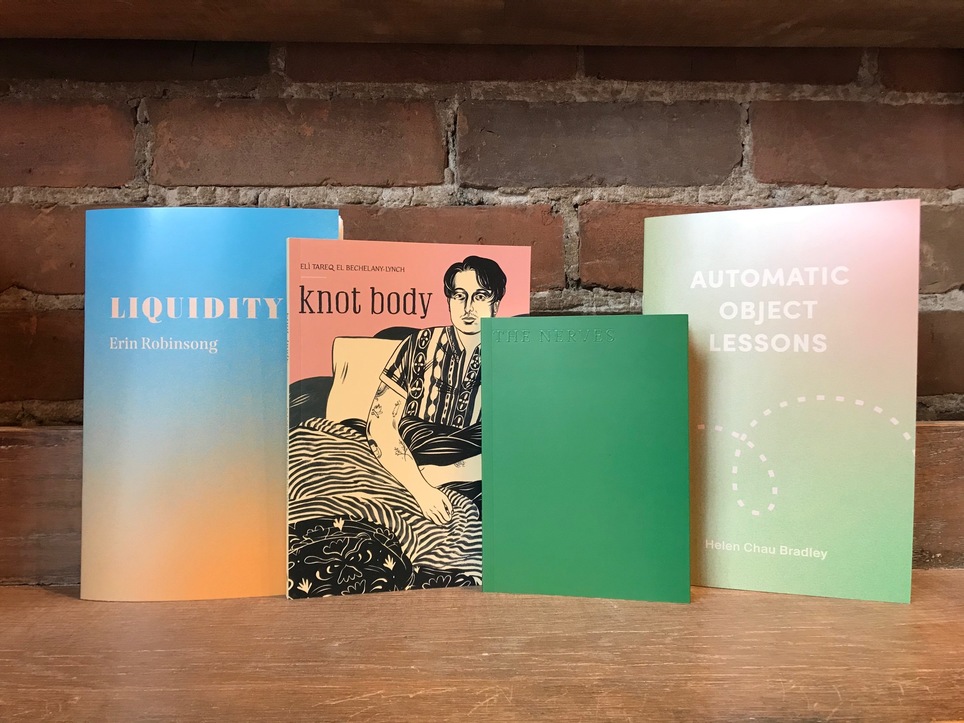
Two of my erstwhile coworkers, Helen Chau Bradley and Eli Tareq Bechelany-Lynch, published books this year! Eli's Knot Body (Metatron Press) is a collection of poems, essays, and letters to "friends, lovers, and in-betweens" that confronts how embodiment is conditioned by capitalism, fatphobia, transness, ableism, and racialization. It's tender, creaturely, and companionable. Helen's Automatic Object Lessons (House House Press) is an experiment in constraint: each poem is composed of words and phrases generated by an online language-learning app. She wrings a surprising amount of poignancy out of the material, which ends up being about the niceties of social interactions and the collective imaginary delineated by "basic" language protocols: manners, expectations, feelings, hopes, and judgments, in miniature.
House House also published a chapbook, Liquidity, by local poet Erin Robinsong that's metaphysical and materialist, environmental and sensual. The Nerves (also Metatron), by Toronto art writer Lena Suksi, is a fervidly psychedelic odyssey of queer eros told in approachable fragments, each one about an imaginary partner, all bodies and genders indeterminate. Its perversity is warm and sweet, almost utopian, free of fear, violence, or insecurity. Is this what liberation feels like?
Unread and Anticipated
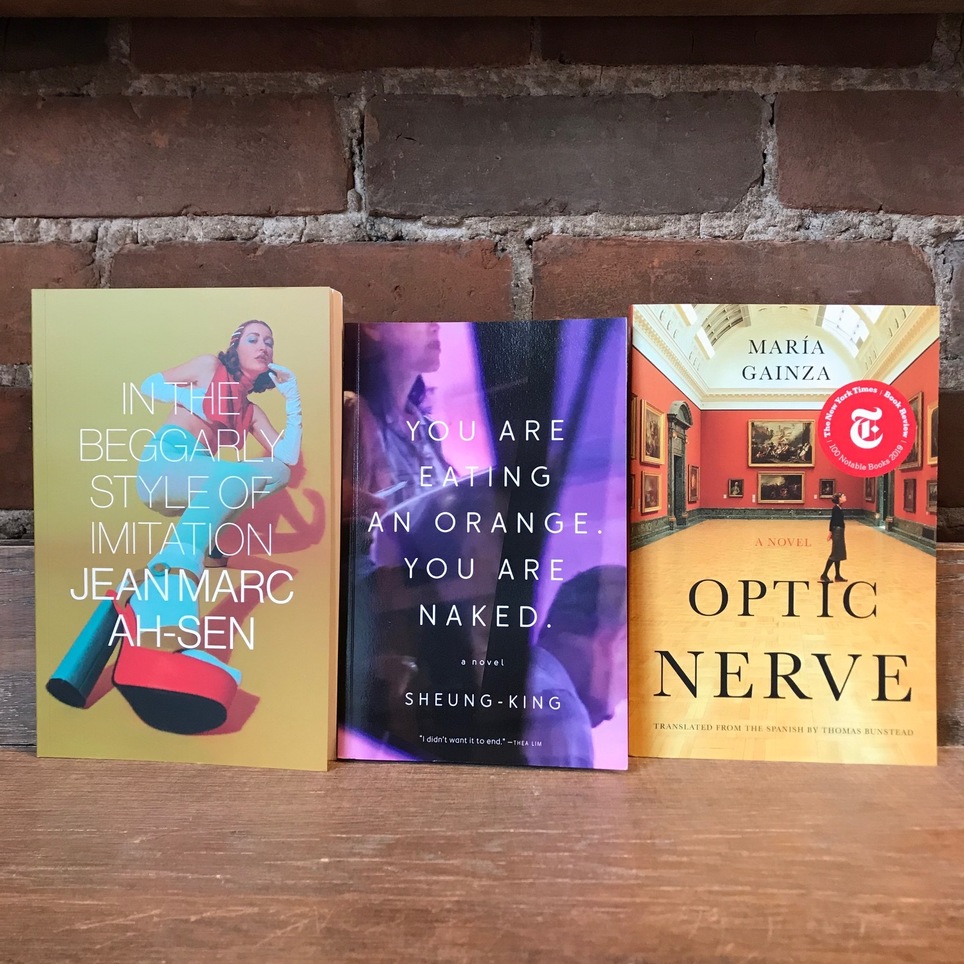
Jean-Marc Ah-Sen's In the Beggarly Style of Imitation brazenly flaunts a style that might be labelled pretentious, with florid, anachronistic diction and an unruly resistance to genre. This book contains aphorisms, essays, satire, and self-mythologizing autofiction, but remains ultimately uncontainable.
Sheung-King's debut novel, You Are Eating a Orange. You Are Naked. is a moody and enigmatic tale of romance and travel between a translator and his unnamed lover. It wafts from Toronto to Hong Kong, Macau, Prague and Tokyo, bathed with the atmospheric ambiance of a Wong Kar-wai film.
Maria Gainza's Optic Nerve is a hybrid essay-novel narrated by an art-obsessed Argentinean woman as she guides the reader through a gallery of masterworks of Western art history; for fans of César Aira and John Berger.
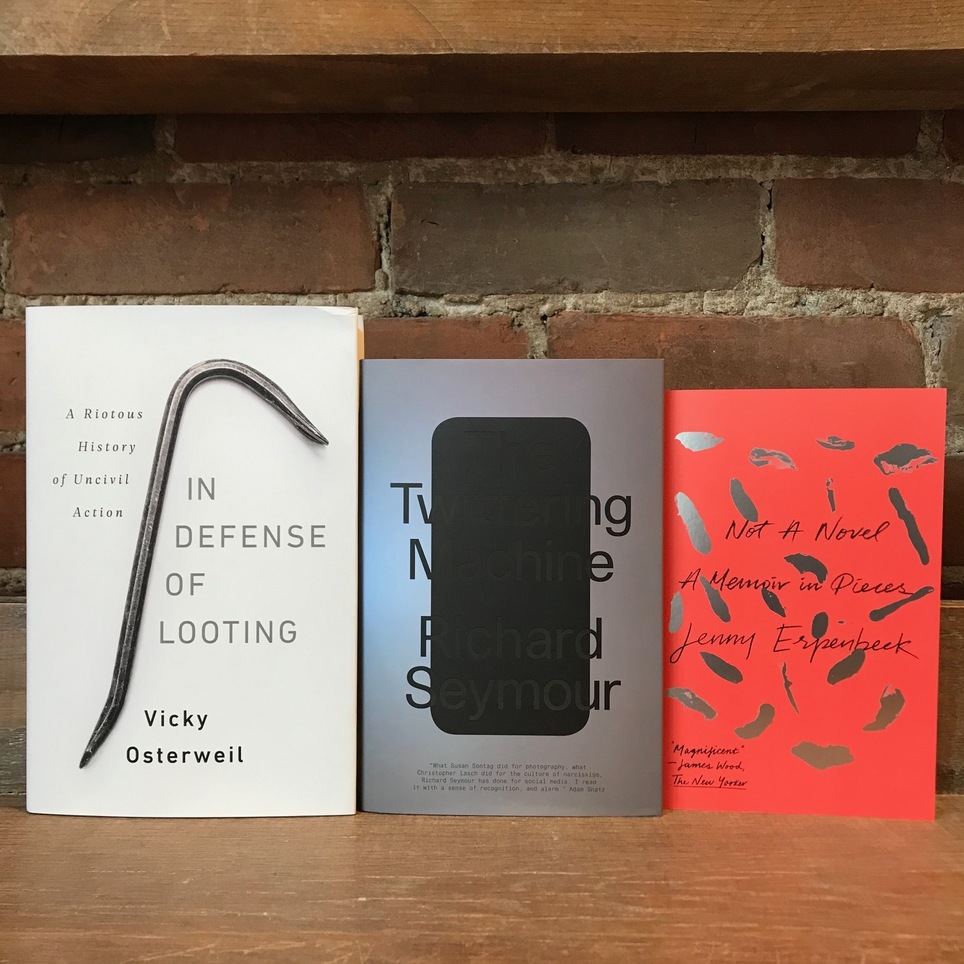
In non-fiction I'm eager to read, Vicky Osterweil's In Defense of Looting expands her 2014 New Inquiry essay, originally written in the wake of the Ferguson protests and (imo) a landmark political essay of the 21st century—now updated for today's era of uprisings.
Richard Seymour's The Twittering Machine attempts a new critical theory of social media, with (I'm told) impressive results.
Jenny Erpenbeck's Not a Novel is a collection of essay-memoirs by the much-admired German author, narrating her school days in East Berlin, the collapse of the Wall, and her self-discovery as a writer.
Not pictured, but also anticipated: Anne Boyer's The Undying, which came out in paperback this year, just in time for her to win the Pulitzer Prize—an unexpected honour for a Marxist poet!
Edible
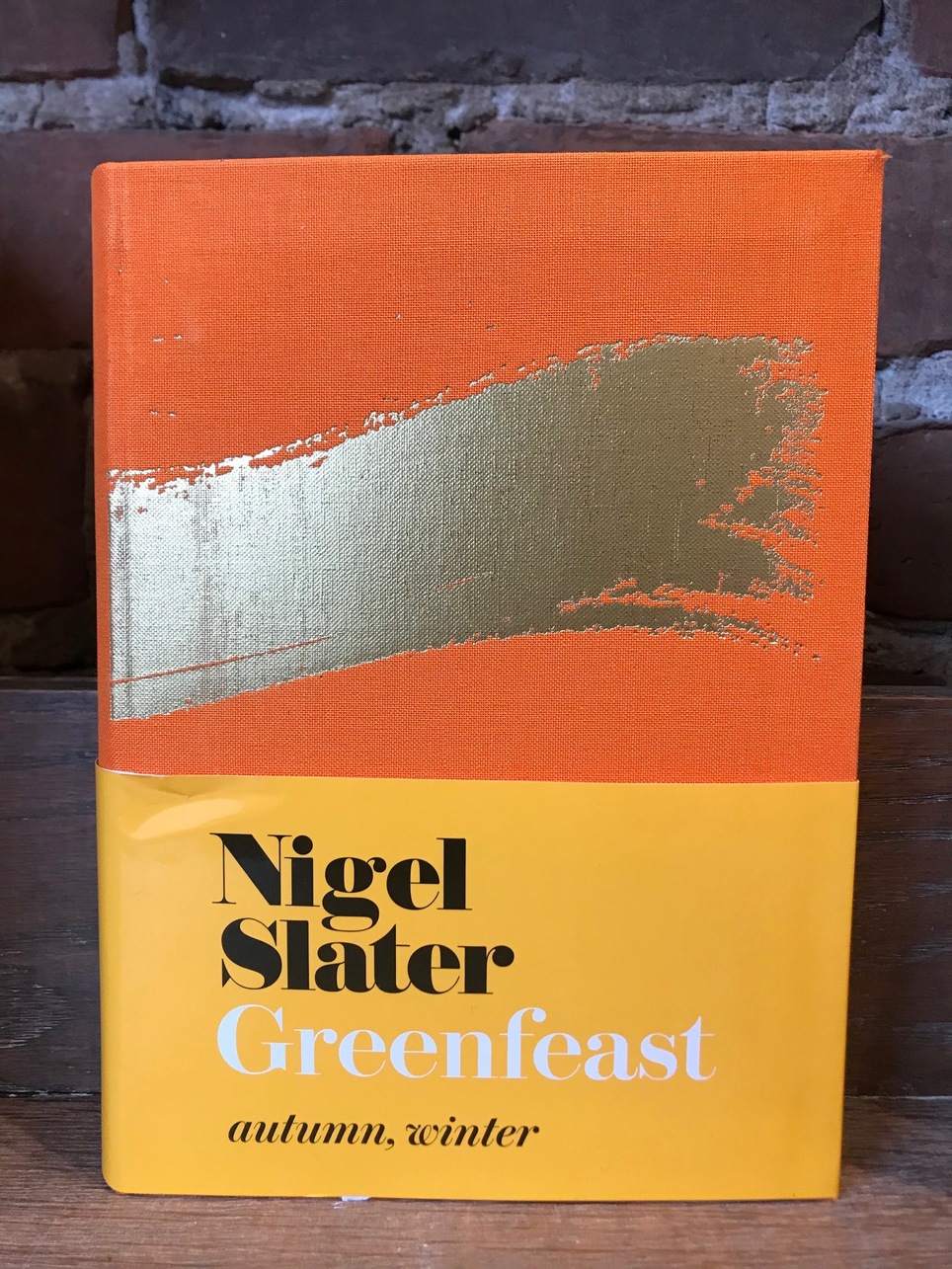
If I had to mention just one cookbook I loved this year, it would be Greenfeast. I'm a longtime fan of Nigel Slater's irrepressibly British food writing, full of quaint affectations and inexact measurements, but this Fall and Winter-themed cookbook is more packed with cold-weather delights than Slater's own root cellar—all warm, satisfying, and simple one-dish recipes. With most cookbooks, I'll page through, try three or four recipes, and then set them aside. With this one, I've cooked half a dozen things and they're all incredible. Plus, it's all vegetarian, which is a welcome evolution given that Slater's earlier Tender books (which I also love!) tended to "improve" vegetables by smothering them in cheeses and cured meats. Particular highlights include the curried butternut squash with breadcrumbs and the butternut squash soup with tahini and sesame (what can I say, I love butternuts). He also has some great ideas for beets!
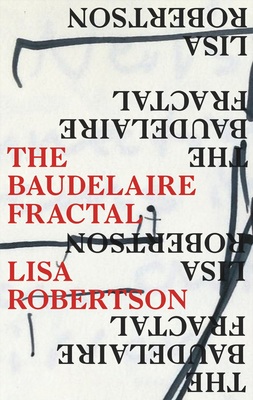
The Baudelaire Fractal
Lisa Robertson
A debut novel by acclaimed poet Lisa Robertson, in which a poet realizes she has written the works of Baudelaire. One morning, the poet...
More Info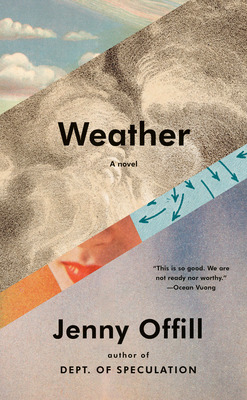
Weather
Jenny Offill
From the author of the nationwide best seller Dept. of Speculation--one of the New York Times Book Review's Ten Best Books of the Year--a...
More Info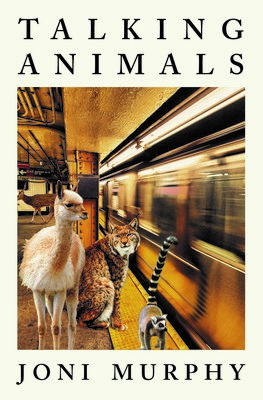
Talking Animals
Joni Murphy
A fable for our times, Joni Murphy's Talking Animals takes place in an all-animal world where creatures rather like us are forced to deal...
More Info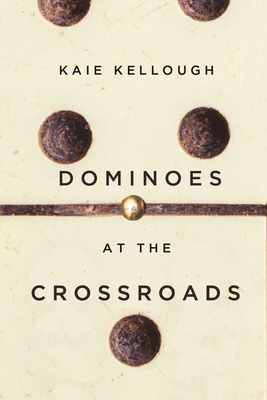
Dominoes at the Crossroads
Kaie Kellough
In Dominoes at the Crossroads Kaie Kellough maps an alternate nation--one populated by Caribbean Canadians who hopscotch across the country. The characters navigate race,...
More Info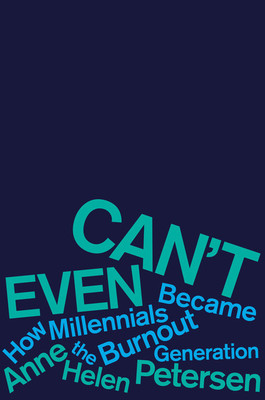
Can't Even
Anne Helen Petersen
A BEST BOOK OF THE FALL AS SEEN IN:Apartment Therapy •Book Riot •Business Insider •BuzzFeed •Daily Nebraskan •Entertainment Weekly •Esquire •Fortune •Harper’s Bazaar •HelloGiggles...
More Info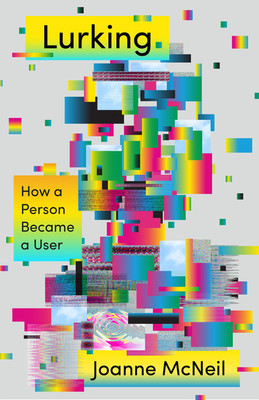
Lurking
Joanne McNeil
A concise but wide-ranging personal history of the internet from—for the first time—the point of view of the userIn a shockingly short amount of...
More Info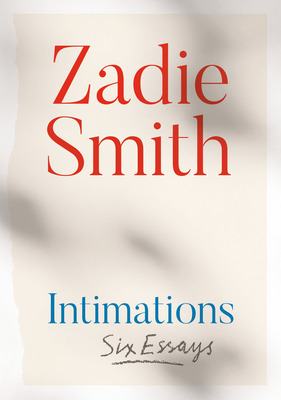
Intimations
Zadie Smith
Deeply personal and powerfully moving, a short and timely series of essays on the experience of lock down, by one of the most clear-sighted...
More Info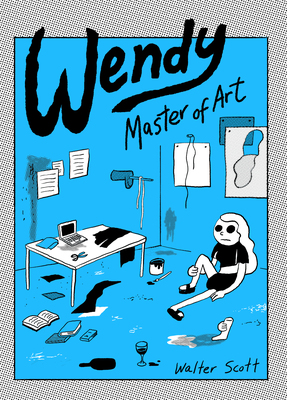
Wendy, Master of Art
Walter Scott
The existential dread of making (or not making) art takes center stage in this trenchant satire of MFA culture Wendy is an aspiring contemporary...
More Info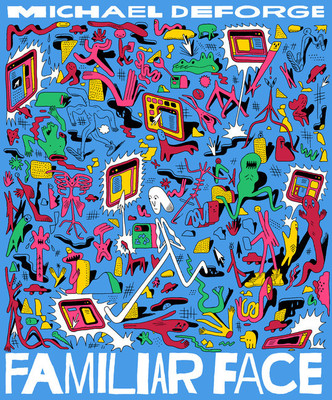
Familiar Face
Michael DeForge
The bodies of citizens and the infrastructure surrounding them is constantly updating. People can?t recognize themselves in old pictures, and they wake up in...
More Info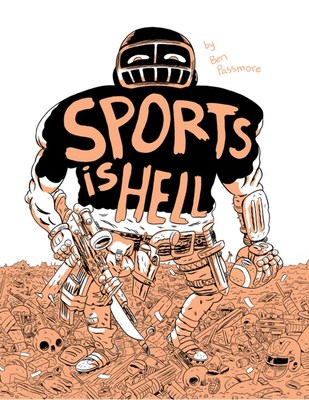
Sports Is Hell
Ben Passmore
After her city wins the Super Bowl for the first time, Tea is separated from her friend during a riot and joins a small...
More Info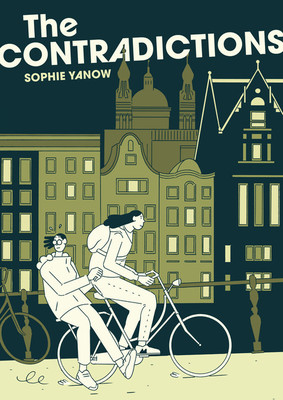
The Contradictions
Sophie Yanow
The Eisner Award-winning story about a student figuring out radical politics in a messy world. Sophie's young and queer and into feminist theory. She...
More Info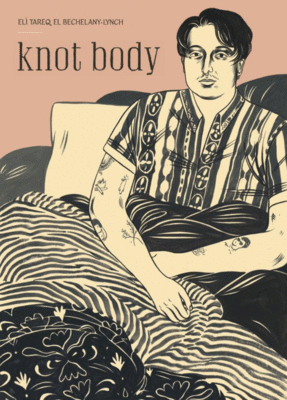
knot body
Eli Tareq El Bechelany-Lynch
Bringing together poetry, essay, and letters to "lovers, friends and in-betweens," Eli Tareq Bechelany-Lynch confronts the ways capitalism, fatphobia, ableism, transness, and racializations affect...
More Info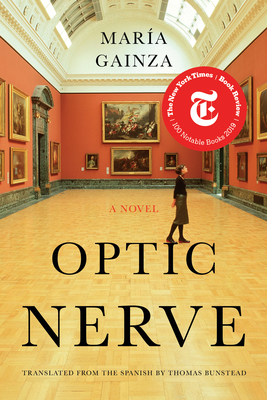
Optic Nerve
Maria Gainza
"In this delightful autofictionâ??the first book by Gainza, an Argentine art critic, to appear in Englishâ??a woman delivers pithy assessments of world-class painters along...
More Info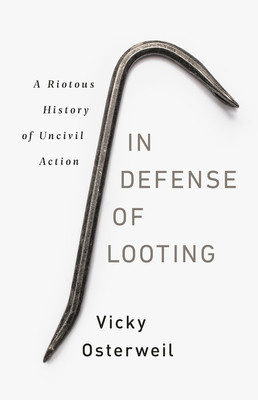
In Defense of Looting
Vicky Osterweil
A fresh argument for rioting and looting as our most powerful tools for dismantling white supremacy.Looting -- a crowd of people publicly, openly, and...
More Info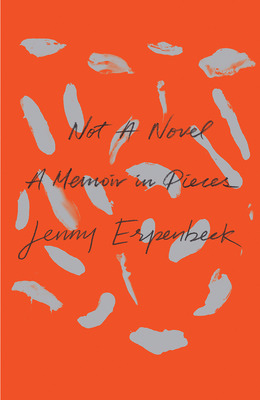
Not a Novel
Jenny Erpenbeck
Jenny Erpenbeck’s highly acclaimed novelGo, Went, Gone was a New York Times notable book and launched one of Germany’s most admired writers into the...
More Info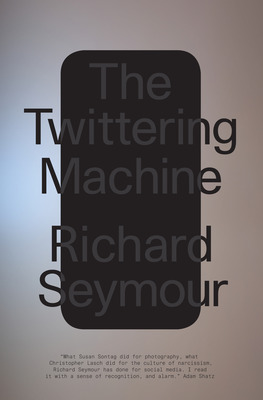
The Twittering Machine
Richard Seymour
A brilliant probe into the political and psychological effects of our changing relationship with social mediaFormer social media executives tell us that the system...
More Info